Woman Seeks Redditors' Opinion To Know If She Was Wrong For Serving Her Mother-In-Law "Dog’s Water"
There have been countless jokes made about mothers-in-law. In reality, stereotypes portray the mother-in-law as the family member who causes the greatest trouble.
The duty of a mother-in-law is not only difficult but also labor-intensive. One of the most crucial roles in a happy family dynamic is being a supportive mother-in-law.
You should first learn how to be a good mother-in-law because this relationship can influence how you will behave as a grandmother someday. As you can already tell, today’s story features someone’s mother-in-law.
This someone is actually a Redditor named u/milwateraita, who shares her story in the AITA subreddit community. According to her account, her in-laws came over for dinner, and she had "glasses on the table with ice and was filling them with water from a pitcher."
Her mother-in-law resumed filling the glasses after the OP left them to attend to something else. Then, the OP’s stepdaughter stopped her and told her not to use it, as it was the dog’s water.
This left the mother-in-law confused, as the OP was just using the same pitcher. One thing led to another, and the OP was now being accused of trying to poison her mother-in-law with dog germs.
I’ll pause right here and let you read all the juicy details of this confusing scenario for yourself, so keep scrolling and enjoy.
The Headline...

My mother-in-law is confused
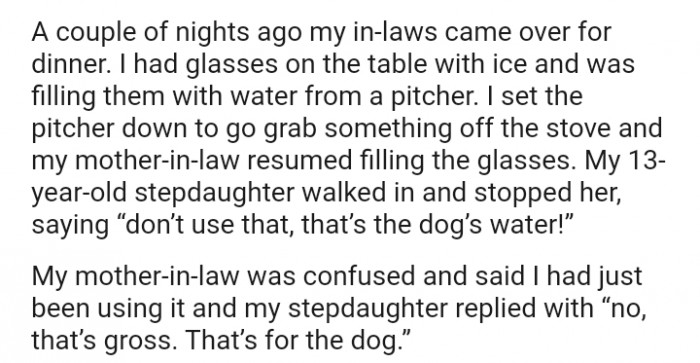
Some context here for clarification
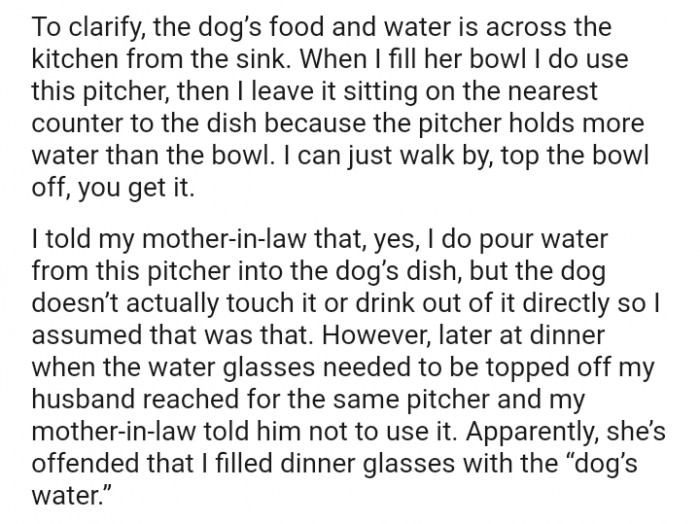
Interpreting Social Norms in Family Dynamics
Dr. Angela Price, a sociologist at Columbia University, explains that family members often have unspoken norms regarding behavior, especially around pets.
Her research indicates that misunderstandings can arise when these norms are not communicated clearly, leading to conflicts.
This incident exemplifies how differing perceptions of appropriateness can create rifts within family relationships.
Cultural Perceptions of Pet Care
Dr. Marcus Alvarez, a cultural psychologist at the University of Chicago, highlights how cultural beliefs shape our views on pet care.
His research suggests that what may seem humorous to one individual can be deeply offensive or disrespectful to another, particularly in multicultural families.
Understanding these cultural nuances is essential for fostering respect and harmony within families.
Do I owe my mother-in-law an apology?
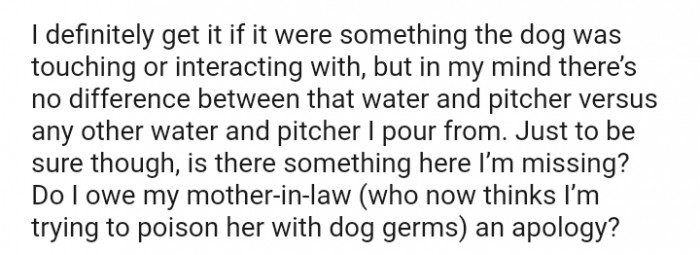
The Reddit thread received hundreds of comments, and here are some of the most upvoted ones...
1. It is just water

2. Does she want a separate faucet for the dog?

Behavioral experts note that the emotional significance of pets can amplify disagreements about their treatment. According to Dr. William Doherty, family therapist, "Pets often serve as family members, and any perceived disrespect towards them can lead to significant emotional distress." This illustrates how emotional attachments to pets can complicate familial interactions, as highlighted by Dr. Kelly McGonigal, health psychologist, who states, "Our relationships with pets can mirror our human relationships, making conflicts over their care particularly poignant."
Studies show that misunderstandings about pet care can lead to significant interpersonal conflicts. According to Dr. John Gottman, a renowned marriage researcher, "Many conflicts arise from differing expectations and communication styles, which can be exacerbated by cultural differences." These divergent expectations about pet ownership and care can often be mitigated through open communication and cultural sensitivity, as noted by Dr. Pepper Schwartz, a sociologist who emphasizes the importance of understanding diverse perspectives in relationships.
3. Your mother-in-law is just confused

4. "The water in your sink is the same as the water in your toilet"
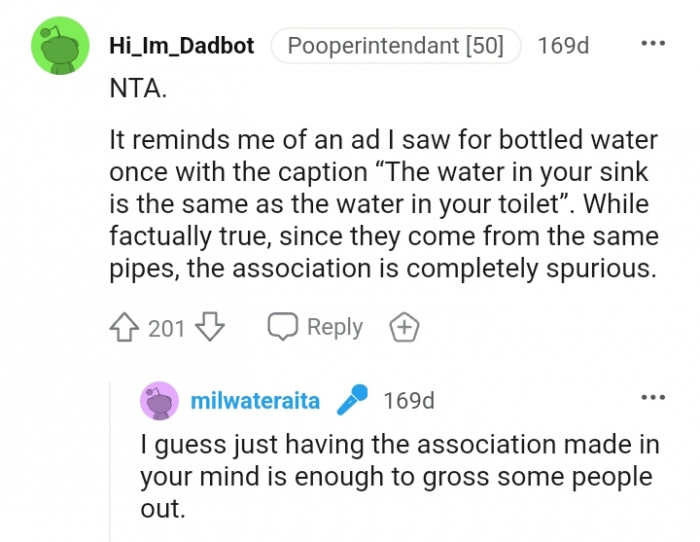
5. We used a kettle to fill the dog's water

Understanding Boundaries in Caregiving
Establishing clear boundaries is essential in caregiving roles, particularly when it involves pets.
Research indicates that caregivers who communicate their limits effectively are less likely to experience resentment or conflict.
In this case, the misunderstanding over the dog's water highlights the need for explicit discussions about pet care responsibilities within families.
Navigating Family Dynamics
Family dynamics play a crucial role in how pet care decisions are made and perceived.
Research indicates that family members often project their values and beliefs onto pet care, which can lead to conflicts.
Encouraging family discussions about pet care roles can foster understanding and collaboration.
6. An adult cannot be excused

7. Don't disrespect your dog like that

8. The kid's perception was natural
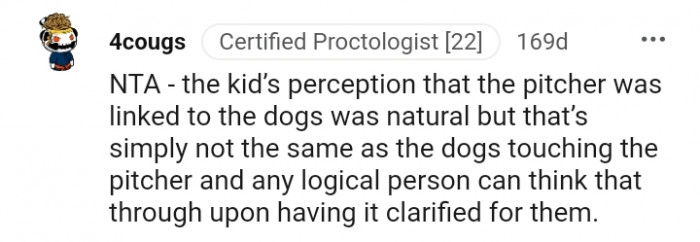
Practical strategies for improving communication about pet care include setting family meetings to discuss responsibilities and expectations.
Encouraging each family member to voice their concerns can promote understanding and reduce tension.
Implementing a shared care calendar can also help clarify who is responsible for specific tasks, minimizing potential conflicts.
To address conflicts over pet care responsibilities, families should engage in transparent conversations about expectations.
Experts in family therapy suggest that establishing clear roles can help prevent misunderstandings and promote harmony.
This collaborative approach can strengthen familial bonds and ensure that everyone feels valued and heard.
9. This Redditor is totally amazed

10. This Redditor never liked their grandma
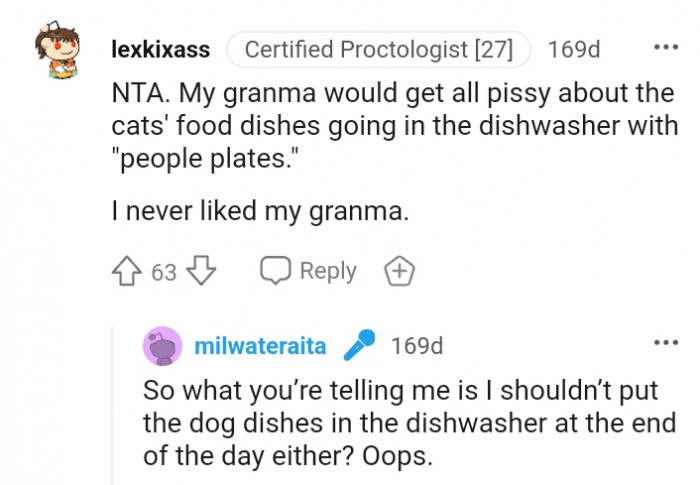
11. Consider refilling the pitcher

The Psychological Impact of Miscommunication
Miscommunication can lead to significant emotional distress, particularly in close relationships.
Studies show that feelings of neglect or disrespect can trigger defensive reactions, often rooted in past experiences.
This highlights the importance of addressing misunderstandings promptly to prevent escalation and promote emotional healing.
The Importance of Empathy in Pet Care
Empathy is crucial in understanding differing perspectives on pet care within families.
Dr. Susan David, an emotional agility expert, emphasizes that "cultivating empathy allows us to connect with others' experiences, reducing conflicts and enhancing relationships." You can find more insights on her work at susandavid.com.
Encouraging family members to share their feelings about pet roles can foster a more supportive environment.
12. Stepdaughter and mother-in-law need to chill
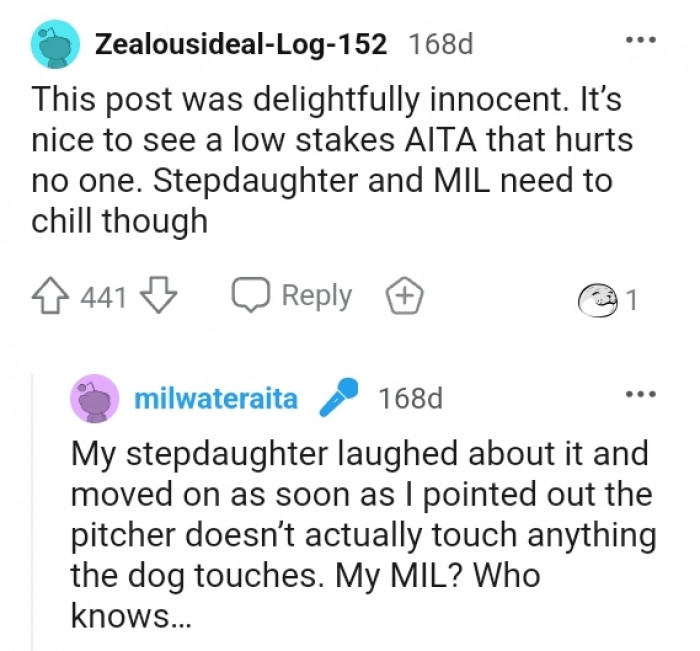
13. MIL is more than old enough to understand
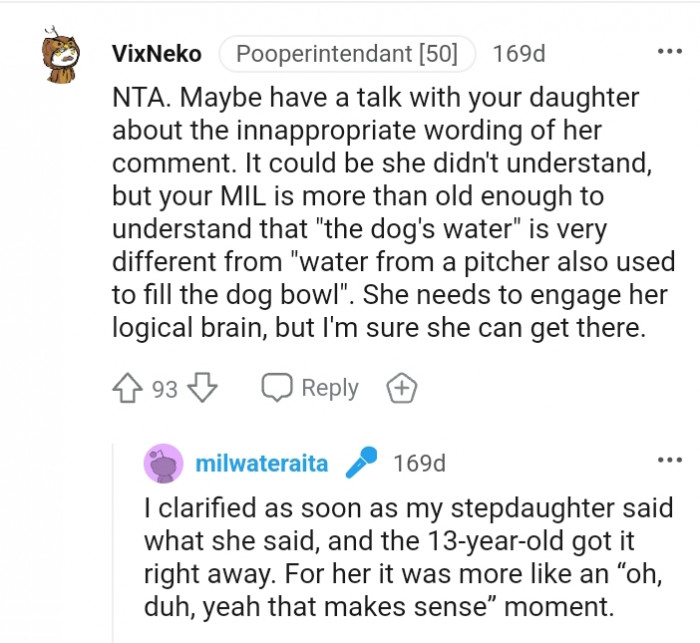
14. Are you supposed to have multiple pitchers?

Experts recommend practicing active listening and empathy to navigate conflicts arising from miscommunication.
Encouraging family members to express their feelings in a constructive manner can facilitate resolution and strengthen relationships.
Additionally, utilizing 'I' statements can help reduce blame and promote understanding.
Implementing family rituals around pet care can enhance emotional connections and shared responsibilities.
Studies show that rituals can create a sense of belonging and promote collaboration among family members.
Engaging in joint activities related to pet care can strengthen the family unit and create lasting memories.
15. One day, she will be your best friend
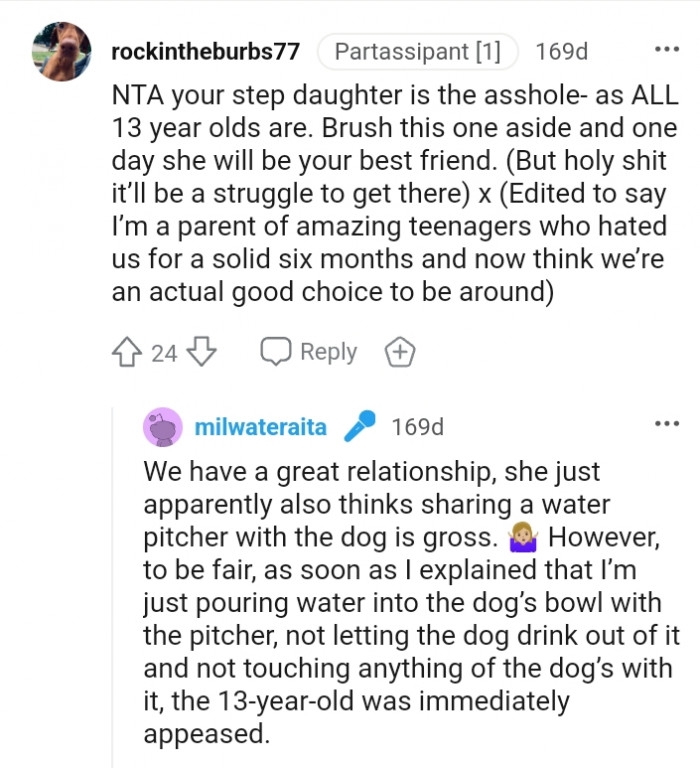
16. Why would your stepdaughter instigate was nasty in the first place?

17. It seems ridiculous to me
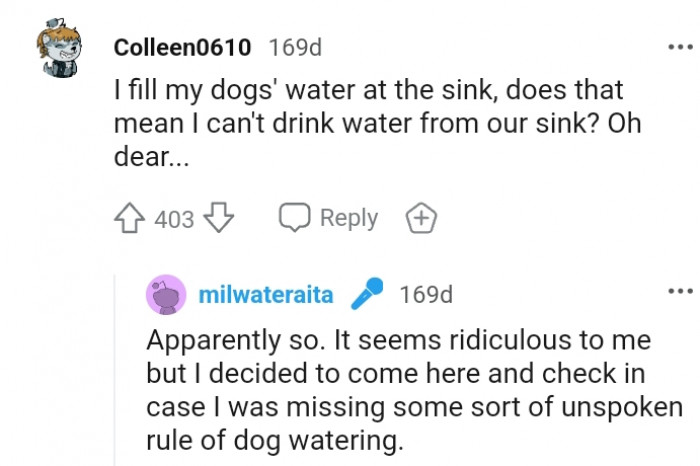
The Role of Empathy in Family Relationships
Empathy plays a crucial role in maintaining strong family bonds, particularly when conflicts arise.
According to Dr. Esther Perel, a renowned couples therapist, "Empathy is the antidote to conflict; it allows us to see the world through another's eyes." This highlights the significance of empathetic communication in enhancing relationship satisfaction.
Understanding each other's perspectives is essential, especially in emotionally charged situations, as noted by Dr. Laura Berman, who states, "When we listen with empathy, we create a safe space for open dialogue and healing."
Addressing Miscommunication
Miscommunication can lead to significant issues in pet care, especially in multicultural families.
Research shows that clarifying intentions and expectations can help mitigate misunderstandings.
Encouraging family members to express their thoughts and feelings openly can promote better communication and understanding.
18. By logic, does that mean...

19. We may not be the best judges
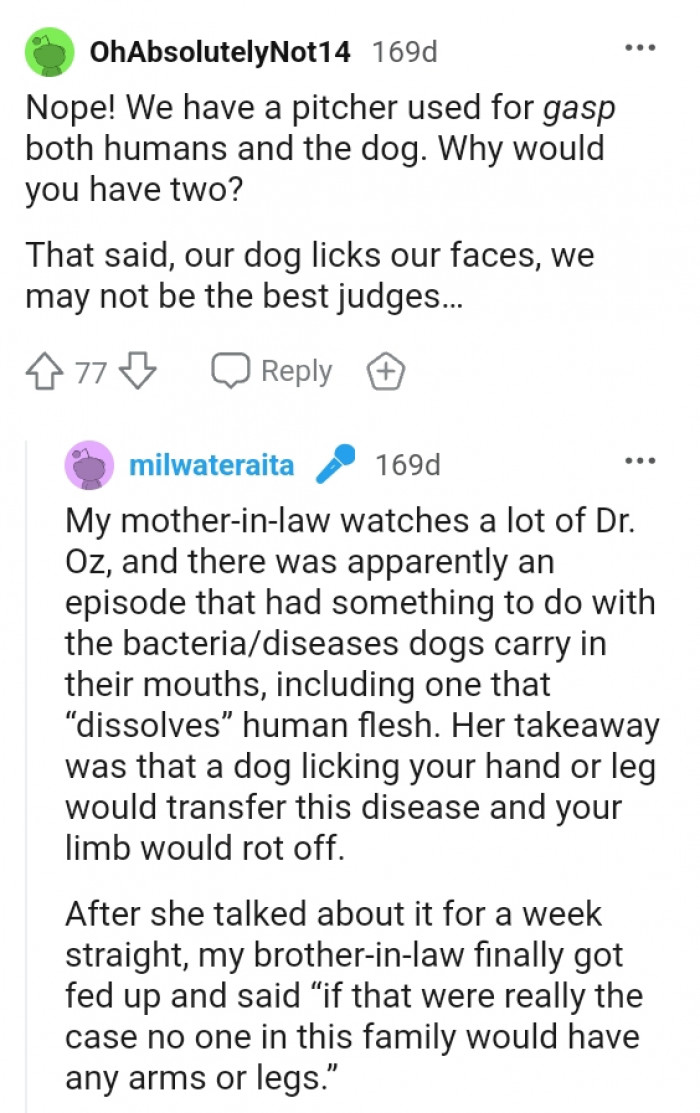
20. The pitcher literally just holds water

Incorporating family activities centered around pet care can foster empathy and collaboration.
Engaging in shared responsibilities, such as walking the dog or preparing food, can strengthen bonds and create opportunities for dialogue.
Ultimately, fostering an environment of mutual respect and understanding is key to navigating the complexities of family dynamics.
Seeking the assistance of a family therapist can provide valuable insights into navigating pet care conflicts.
Professional guidance can help families address underlying issues and improve communication dynamics.
Investing in family therapy can create a stronger foundation for resolving conflicts and enhancing relationships.
Well, that's quite a story. As Redditors clearly stated, you don’t expect one to have two faucets when it’s still the same water that will flow out. The mother-in-law clearly misunderstood things despite the whole explanation, don’t you think so?
Share your thoughts about this story with us by leaving your replies in the comments section below.
Psychological Analysis
This situation highlights the importance of empathy and understanding in family dynamics surrounding pet care.
Addressing these issues thoughtfully can lead to stronger familial bonds and a more supportive environment for everyone involved.
Analysis generated by AI
Analysis & Alternative Approaches
Understanding the cultural and relational dynamics of pet care is essential for fostering harmonious family relationships.
Research consistently shows that open communication and empathy are key to resolving conflicts and enhancing emotional connections.
Analysis & Alternative Approaches
Addressing communication breakdowns within families is essential for fostering healthy relationships, especially around shared responsibilities like pet care.
Research confirms that open discussions about expectations can enhance emotional well-being and strengthen familial ties.



